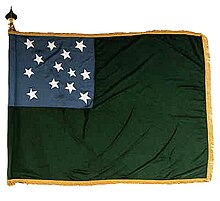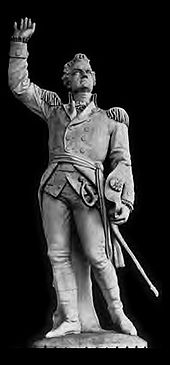Ethan Allen
Allen wrote accounts of his exploits in the war that were widely read in the 19th century, as well as philosophical treatises and documents relating to the politics of Vermont's formation.
His business dealings included successful farming operations, one of Connecticut's early iron works, and land speculation in the Vermont territory.
[28] Allen denied taking any money[28] and claimed that Duane was outraged and left with veiled threats, indicating that attempts to enforce the judgment would be met with resistance.
[33] Friction increased with the provincial government in October 1771, when Allen and a company of Green Mountain Boys drove off a group of Scottish settlers near Rupert.
Most of these incidents did not involve bloodshed, although individuals were at times manhandled, and the Green Mountain Boys sometimes did extensive property damage when driving tenants out.
[37] The outrage of the Wentworth proprietors was renewed in 1774 when Governor Tryon passed a law containing harsh provisions clearly targeted at the actions of the "Bennington Mob".
[40] Allen spent much of the summer of 1774 writing A Brief Narrative of the Proceedings of the Government of New York Relative to Their Obtaining the Jurisdiction of that Large District of Land to the Westward of the Connecticut River, a 200-page polemic arguing the position of the Wentworth proprietors.
Most of the resistance activity had taken place on the west side of the Green Mountains until then, but a small riot broke out in Westminster on March 13 and led to the deaths of two men.
[44] Allen and a troop of Green Mountain Boys traveled to Westminster where the town's convention adopted a resolution to draft a plea to the King to remove them "out of so oppressive a jurisdiction".
[47] Allen received a message from members of an irregular Connecticut militia in late April, following the battles of Lexington and Concord, that they were planning to capture Fort Ticonderoga and requesting his assistance in the effort.
[52] The troops procured a few boats around 2 a.m. for the crossing, but only 83 men made it to the other side of the lake before Allen and Arnold decided to attack, concerned that dawn was approaching.
[61] After two days without significant food (which they had forgotten to provision in the boats), Allen's small fleet met Arnold's on its way back to Ticonderoga near the foot of the lake.
Rather than attempt an ambush on those troops, which significantly outnumbered his tired company, Allen withdrew to the other side of the river, where the men collapsed with exhaustion and slept without sentries through the night.
[69] On July 4, Allen and Warner made their case to New York's Provincial Congress, which, despite the fact that the Royal Governor had placed a price on their heads, agreed to the formation of a regiment.
Accompanied by a small number of Americans, he again set out, traveling through the countryside to Sorel, before turning to follow the Saint Lawrence River up toward Montreal, recruiting upwards of 200 men.
[84][c] Allen wrote of the voyage that he "was put under the power of an English Merchant from London, whose name was Brook Watson: a man of malicious and cruel disposition".
There is an original something in him that commands admiration; and his long captivity and sufferings have only served to increase, if possible, his enthusiastic zeal According to another prisoner's account, Allen wandered off after learning of his son's death.
[95] There Allen remained while Vermont declared independence, and John Burgoyne's campaign for the Hudson River met a stumbling block near Bennington in August 1777.
On May 14, he was breveted a colonel in the Continental Army in "reward of his fortitude, firmness and zeal in the cause of his country, manifested during his long and cruel captivity, as well as on former occasions,"[92] and given military pay of $75 per month.
[102] Shortly after his arrival, Vermont's Assembly passed the Banishment Act, a sweeping measure allowing for the confiscation and auction by the republic of property owned by known Tories.
[108] In a dispatch to Clinton from Westminster, two prisoners from New York sentenced after Allen's intervention pleaded with the governor to free them from being at "the disposal of Ethan Allin [sic] which is more to be dreaded than Death with all its Terrors.
As a replacement for organized religion, he espoused a mixture of deism, Spinoza's naturalist views, and precursors of Transcendentalism, with man acting as a free agent within the natural world.
[120] Allen met his second wife, a young widow named Frances "Fanny" Montresor Brush Buchanan, early in 1784; and after a brief courtship, they wed on February 16, 1784.
Fanny came from a notably Loyalist background (including Crean Brush, notorious for acts during the Siege of Boston, from whom she inherited land in Vermont), but they were both smitten, and the marriage was a happy one.
A lack of cash, complicated by Vermont's currency problems, placed a strain on Fanny's relatively free hand on spending, which was further exacerbated by the cost of publishing Reason, and of the construction of a new home near the mouth of the Onion River.
[137] The funeral was attended by dignitaries from the Vermont government and by large numbers of common folk who turned out to pay respects to a man many considered their champion.
"Allen was an ignorant and profane Deist, who died with a mind replete with horror and despair" was the opinion of Newark, New Jersey's Reverend Uzal Ogden.
[147] The nearest potential images included one claimed to be by noted Revolutionary War era engraver Pierre Eugene du Simitiere that turned out to be a forgery, and a reference to a portrait possibly by Ralph Earl that has not been found (as of Stewart Holbrook's writing in 1940).
[148] Alexander Graydon, with whom Allen was paroled during his captivity in New York, described him like this: His figure was that of a robust, large-framed man, worn down by confinement and hard fare; but he was now recovering his flesh and spirits; and a suit of blue clothes, with a gold laced hat that had been presented to him by the gentlement of Cork, enabled him to make a very passable appearance for a rebel colonel ...
[150] Two ships of the United States Navy were named USS Ethan Allen in his honor, as were two 19th-century fortifications: a Civil War fort in Arlington County, Virginia and a cavalry outpost in Colchester and Essex, Vermont.









